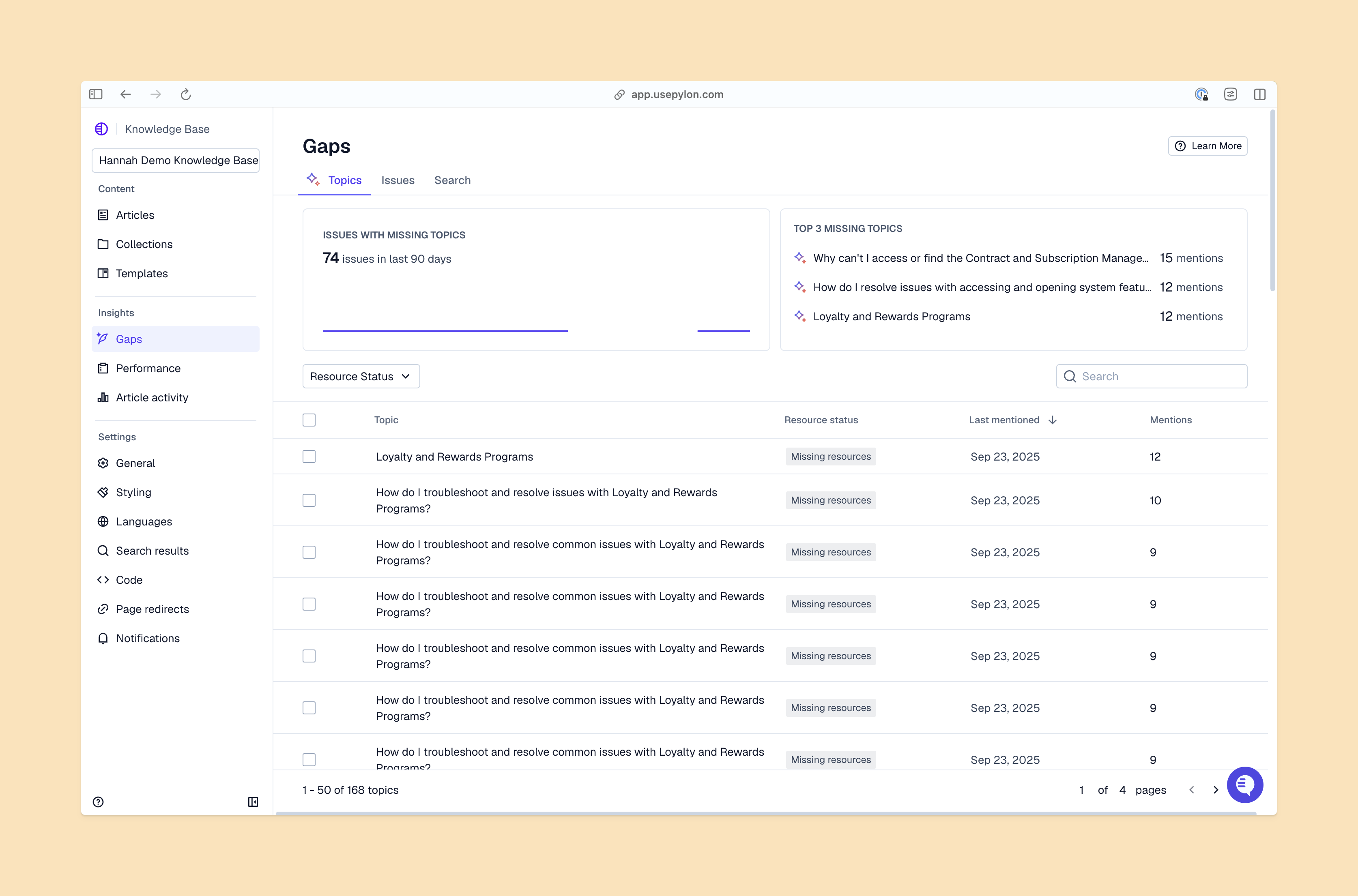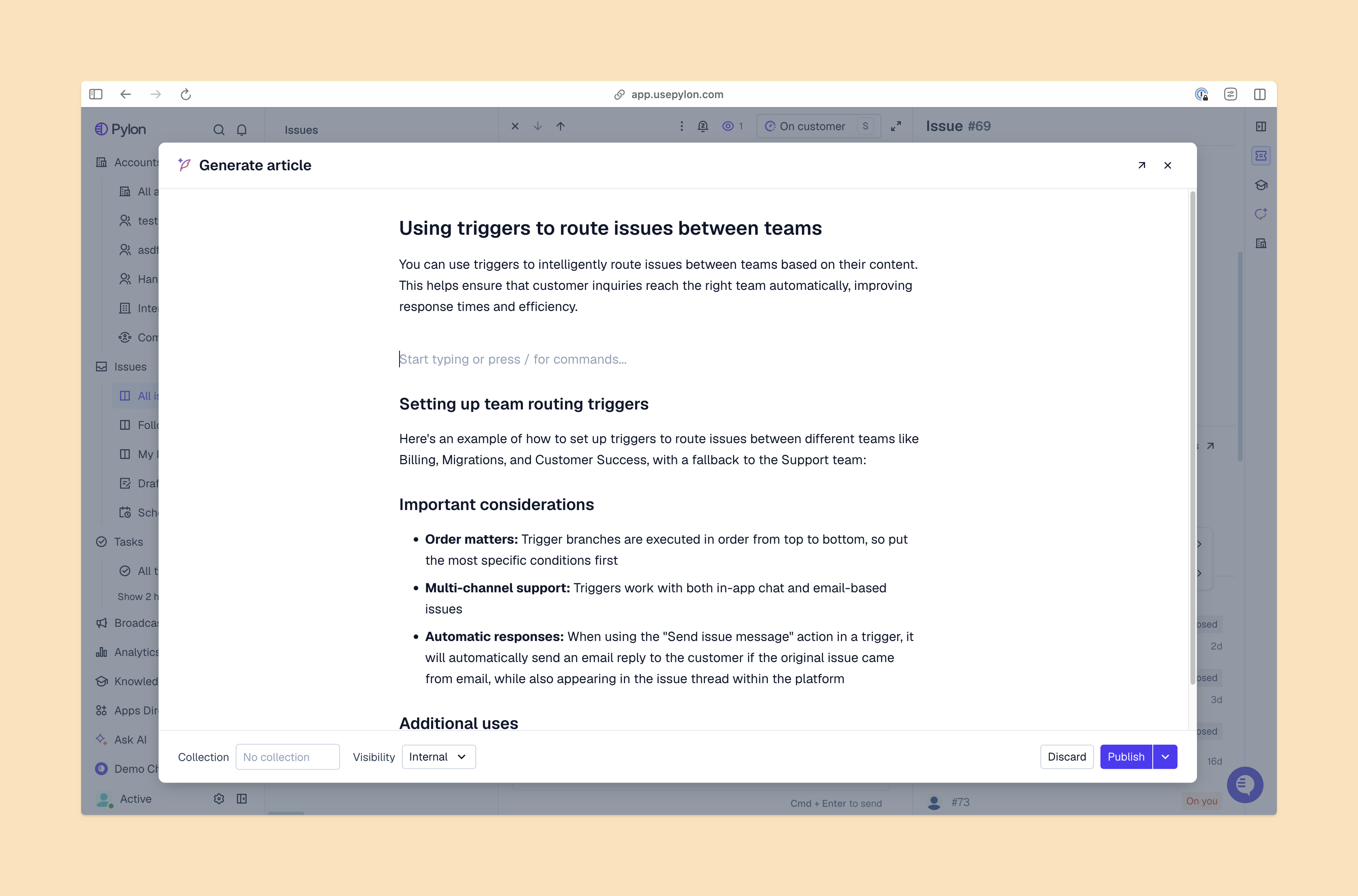How AI Is Transforming B2B Customer Support | Complete Guide for 2025
Discover how leading B2B companies use AI to automate routine support issues, build smarter knowledge bases, and deliver personalized customer support at scale. This guide explains proven strategies for implementing AI in your support organization, from choosing the right platform to measuring ROI.
Updated on October 17, 2025 | 13 min read
TL;DR
- AI is revolutionizing B2B customer support by automating responses, improving knowledge management, and personalizing interactions at scale.
- According to Intercom's 2024 Customer Service Trends Report, 77% of support teams think AI will increase customer expectations for response times.
- This guide specifically explores how AI improves knowledge management, which platforms use AI to draft support articles, and how generative AI personalizes support interactions for B2B teams.
The AI Revolution in Customer Support
Customer expectations have fundamentally changed. In 2025, customers expect answers in minutes, not hours. The challenge for B2B support teams is meeting these expectations while maintaining personalized, high-quality service at scale.
Enter artificial intelligence.
AI isn’t just a buzzword or future promise—it's actively transforming how B2B companies deliver customer support. From automating routine responses to drafting knowledge base articles and personalizing every interaction, AI is enabling support teams to do more with less while significantly improving customer satisfaction.
But here's what many organizations miss: AI isn't about replacing your team. It's about empowering them to focus on complex, high-value interactions while AI handles repetitive tasks and augments their capabilities.
How AI Improves Knowledge Management in B2B Customer Support

Your knowledge base is no longer just a repository for self-service articles. In the age of AI, it's the foundation that powers your entire support operation. Gartner predicted that 70% of customer interactions would be handled by AI in 2025, and every one of those interactions depends on well-managed knowledge.
The Knowledge-AI Feedback Loop
AI transforms knowledge management from a static process into a dynamic, continuously improving system:
1. Identifying Knowledge Gaps
Traditional knowledge management relied on manual audits to find missing content. AI totally changes this. Modern AI like Pylon's Knowledge Gaps feature automatically analyze customer conversations to identify topics that aren’t covered by existing documentation.
When AI agents encounter issues they can't resolve, these gaps get flagged in real-time. This means your knowledge base evolves based on actual customer needs rather than assumptions about what content might be useful.
2. Accelerating Content Creation
Creating comprehensive knowledge base articles traditionally took hours. AI copilots now streamline this process dramatically. With AI-powered content generation tools, support teams can:
- Transform a few bullet points into complete, well-structured articles
- Convert resolved support conversations into reusable knowledge base content
- Generate multiple article variations for different audience segments
- Draft FAQ sections based on common customer queries
Platforms like Pylon’s AI Knowledge Management will automatically identify content gaps in your help center and transform a few bullet points into entire knowledge base articles. This reduces article creation time from 30+ minutes to just a few minutes of review and editing.
3. Maintaining Content Quality and Accuracy
AI doesn't just help create content—it helps maintain it. AI systems continuously monitor which articles successfully resolve issues and which ones result in escalations to your support team. This data helps you:
- Identify outdated or inaccurate content that needs updating
- Discover articles that could be expanded with additional information
- Find opportunities to improve article structure or clarity
- Ensure consistency across your entire knowledge base
According to research by Forrester, companies that use AI for customer interaction see a 20% reduction in error rates because of the consistency of AI-driven responses.
4. Optimizing for AI Consumption
Modern knowledge bases need to serve two audiences: human readers and AI systems. This requires specific optimization:
- Clear, unambiguous language: AI performs best with straightforward, jargon-free content
- Structured formatting: Headers, bullet points, and tables help AI parse information efficiently
- Contextual answers: Restating questions in answers gives AI the context it needs
- Consistent terminology: Using the same terms across articles improves AI understanding
To create AI-friendly knowledge base articles, focus on simplicity, structure, and consistency.
Real-World Impact: Knowledge Management ROI
The investment in AI-powered knowledge management delivers measurable returns. Consider this scenario from Intercom's knowledge management guide:
Time Investment: 30 minutes to create one knowledge base article
Results:
- Hours saved for your support team, who no longer need to manually answer repetitive questions
- Customers who get instant answers
- Valuable data on AI performance for continuous improvement
The compounding effect is significant. Every article you create feeds your AI, which handles more issues automatically, freeing your team to improve articles or handle complex issues. Companies using AI for knowledge management have seen support costs reduced by up to 30%, according to research by Deloitte.
Knowledge Management Best Practices for AI
To maximize the effectiveness of AI-powered knowledge management:
Audit your existing content regularly: Divide articles by product area and assign teams to review, update, or retire content.
Cast a wide net for training data: Don't limit AI to just your help center. Include:
- Website content and product documentation
- Saved response macros and templates
- Past support conversations and resolutions
- Internal guides and SOPs
- Blog posts and educational content
Monitor performance metrics: Track which articles drive successful AI resolutions and which result in escalations. This data guides your content strategy and helps prioritize updates.
Build maintenance into workflows: Knowledge management isn't a one-time project. Establish recurring schedules for content review and updating, whether weekly, monthly, or aligned with product releases.
For B2B teams using Slack for customer support or Discord support channels, ensure your knowledge base integrates seamlessly with these platforms so AI can surface relevant articles in context.
Customer Support Platforms Using AI to Draft Articles and Automate Responses

The customer support software landscape has evolved rapidly. Today's leading platforms integrate AI throughout the support workflow, from drafting responses to creating knowledge base content. Here's what modern AI-enabled customer support software can do:
AI-Powered Response Automation
Instant Resolution of Common Issues
Modern AI chatbots and agents don't just provide canned responses, they ingest context and can generate natural, conversational answers. According to McKinsey research, applying generative AI to customer care functions could increase productivity by 30-45%.
Built specifically for B2B teams, Pylon's AI Assistants and AI Agents can understand complex B2B contexts and handle product questions by drawing from your knowledge base, past conversations, and integrated tools. Unlike consumer-focused chatbots, Pylon is optimized for the longer, more technical support interactions common in B2B.
AI-Driven Article Creation and Maintenance
Creating and maintaining knowledge base content at scale requires significant resources. AI is changing this equation:
Automated Article Generation
Several platforms now offer AI-powered article creation:
- Pylon: AI Copilot for articles that helps teams draft, edit, and optimize knowledge base content based on actual support conversations
- Zendesk: Identifies content gaps and generates articles from user-provided bullet points
- Brainfish: Creates a help center based on customer interactions and documentation, then updates outdated articles
Conversation-to-Article Transformation
One of the most practical AI features transforms support conversations into knowledge base articles. When an agent handles a novel issue, AI can:
- Identify that this represents a new or underserved topic
- Extract the key information from the conversation
- Generate a structured article draft
- Suggest where it should be placed in your knowledge base hierarchy
This dramatically reduces the friction in expanding your knowledge base. Instead of manually writing articles, agents can flag conversations that should become articles, and AI handles the heavy lifting.
AI-Powered Agent Assistance
For teams not ready to fully automate customer-facing interactions, AI copilots provide significant value by assisting support teams:
Real-Time Support During Conversations
Copilots like Pylon's Issue Copilot help teams with:
- Suggested responses based on knowledge base articles and past resolutions
- Relevant documentation and context from conversational data
- Tone and grammar suggestions to maintain brand consistency
- Language translation for serving global customers
- Conversation summaries for quick context when handling escalations
Omnichannel AI Integration
B2B support increasingly happens across multiple channels. Modern AI platforms need to work seamlessly across:
- Slack: The most common B2B support channel. Learn how to optimize Slack as a ticketing system.
- Microsoft Teams: Growing in enterprise environments. See our guide on Microsoft Teams helpdesk setup.
- Discord: Popular in developer-focused companies. Check out customer support on Discord.
- Email: Still essential for formal communications.
- In-app chat: For immediate, contextual support.
Pylon specializes in this omnichannel approach, providing unified omnichannel support where AI works consistently across all these channels. This means customers get the same quality of AI-powered support whether they reach out via Slack, email, or your support portal.
Choosing the Right Platform
When evaluating AI customer support platforms, consider:
Your support volume and complexity: High-volume teams with many repetitive issues benefit most from full automation. Teams handling complex technical issues may prefer AI-assisted approaches.
Your existing tools: If you're already using Slack or Microsoft Teams for support, look for platforms with deep integrations with these tools. Slack customer support tools should work seamlessly with your AI platform.
Your team's AI readiness: Some teams want to dive straight into full automation, while others prefer gradual adoption. Choose a platform that matches your comfort level.
Data security requirements: For enterprise B2B, ensure your platform offers robust security.
For comprehensive comparisons, check out our guides on Zendesk alternatives and customer service software options.
How Generative AI Helps Personalize Support Interactions at Scale
The traditional trade-off in customer support has been between personalization and scale. You could deliver personalized, high-touch support to a small number of customers, or you could scale to serve many customers with more generic, template-based responses.
Generative AI eliminates this trade-off. For the first time, B2B companies can deliver deeply personalized support at massive scale.
Understanding Personalization in B2B Support
B2B personalization is different from B2C. In B2B, personalization means:
- Understanding the customer's specific product configuration and integration setup
- Knowing their subscription tier and available features
- Recognizing their level of technical expertise and adjusting language accordingly
- Remembering their issue history and proactively addressing related concerns
- Tailoring recommendations based on their usage patterns and business goals
Generative AI makes this personalization possible by synthesizing information from multiple sources in real-time.
Real-Time Data Synthesis for Context
Modern AI platforms don't just access your knowledge base, they pull relevant context from across your entire tech stack:
Customer Data Integration
AI platforms integrate with CRMs and data warehouses to understand:
- The customer's company size and industry
- Their current contract and usage patterns
- Recent product changes or updates that might affect them
- Open or recently closed support tickets
- Feature requests or feedback they've submitted
Pylon's Account Intelligence exemplifies this approach by aggregating customer data from multiple sources to give AI and support teams complete context.
That level of personalization would otherwise be impossible for support teams to achieve consistently across hundreds of daily conversations.
Dynamic Response Adaptation
Generative AI adapts its responses based on multiple factors:
Technical Sophistication
AI can detect whether a customer is technical or non-technical and adjust explanations accordingly.
Communication Preferences
Some customers want detailed explanations; others want quick answers. AI learns these preferences over time and adjusts response length and style accordingly.
Emotional State
Through sentiment analysis, AI detects when customers are frustrated or confused and adjusts its tone:
- For frustrated customers: Immediate acknowledgment, empathetic language, concrete next steps
- For neutral issues: Efficient, professional responses with relevant resources
According to PwC research, 72% of consumers expect companies to understand their unique needs and expectations in real-time. AI makes this possible in B2B support.
Personalized Knowledge Delivery
Rather than serving generic help center articles, AI personalizes knowledge delivery:
Role-Based Content
AI surfaces different content based on the customer's role:
- Developers see technical documentation and API references
- Administrators see configuration guides and user management docs
- End users see feature tutorials and how-to guides
Journey-Specific Support
AI recognizes where customers are in their journey and provides appropriate support:
- New customers: Onboarding guides, getting-started tutorials, best practices
- Power users: Advanced features, optimization tips, beta feature access
- At-risk customers: Proactive outreach, troubleshooting resources, success stories
Multilingual Personalization
For B2B companies with global customer bases, language is a critical personalization element. Generative AI provides real-time translation that goes beyond simple word substitution:
- Translates technical terminology accurately
- Localizes examples and references
- Handles industry-specific jargon correctly
This helps support teams serve customers in their preferred language.
Account-Level Intelligence and History
B2B support requires understanding not just the individual user, but their entire organization. With Pylon's Account Intelligence, AI can:
- Track all interactions across users within an organization
- Identify patterns in how different teams use your product
- Provide consistent support even when different users from the same customer reach out
This organizational context is crucial for B2B, where solving one user's issue can impact their entire team.
Measuring Personalization Impact
The impact of AI-powered personalization is measurable:
Customer Satisfaction: McKinsey reports that companies using personalization see 5-15% increases in revenue and improved customer retention rates.
Resolution Rates: Personalized, context-aware responses resolve issues faster. Accenture found that companies using AI-driven support see 30-50% increases in customer satisfaction thanks to faster, more personalized responses.
Support Efficiency: AI personalization reduces back-and-forth exchanges. Instead of multiple messages to gather context, AI provides complete, personalized answers immediately.
Balancing Automation and Human Touch
The key to successful personalization at scale is knowing when AI should handle interactions and when humans should step in. Modern platforms like Pylon use AI to:
- Automatically handle routine issues with full personalization
- Assist support teams on complex issues by providing personalized context and suggestions
- Escalate smartly when issues require human judgment, but with full context so your team can pick up seamlessly
This creates the best of both worlds: scale through automation and personal touch, and bring in your team’s expertise where it matters most.
Implementing AI in Your B2B Support Organization
Successfully implementing AI in customer support requires more than just selecting the right platform. Here's a practical framework:
Start with Clear Objectives
Define what you want AI to achieve:
- Reduce response times for common questions?
- Free your team to focus on complex technical issues?
- Scale support while having headcount constraints?
- Improve knowledge base coverage and quality?
- Expand support to additional channels or time zones?
Different goals require different AI implementations. Be specific about your priorities.
Prepare Your Foundation
Before implementing AI, ensure you have:
Clean, Organized Knowledge Base
AI is only as good as the data it has access to. Audit your existing content:
- Update or retire outdated articles
- Fill critical gaps in coverage
- Standardize formatting and structure
- Ensure consistency in terminology
See our guide on knowledge base software for best practices.
Integrated Tech Stack
Connect your support platform with:
- CRM for customer data and context
- Product analytics for usage insights
- Communication tools (Slack, Teams, Discord, email)
This integration enables the personalization and context that makes AI valuable.
Team Buy-In
AI implementation succeeds or fails based on team adoption. Communicate clearly:
- AI is here to help, not replace, your team
- It will handle repetitive work so support teams can do more complex tasks
- Support teams will need to learn new skills, which represents career growth
- The goal is better customer experiences and a team that’s more satisfied
Address concerns transparently and involve team members in implementation decisions.
Monitor and Optimize Continuously
Track key metrics to measure AI impact:
Performance Metrics:
- AI resolution rate (percentage of issues fully resolved by AI)
- AI accuracy (percentage of AI responses that were correct and helpful)
- Escalation rate (how often AI needs to hand off to your support team)
- Customer satisfaction (CSAT) for AI interactions vs. interactions with your team
Efficiency Metrics:
- First response time (should decrease dramatically)
- Average handle time (should decrease for your team)
- Support cost per ticket (should decrease as AI handles more volume)
Knowledge Metrics:
- Knowledge base coverage (percentage of issues that match existing articles)
- Article performance (which articles drive successful AI resolutions)
- Content gaps (common issues without adequate documentation)
Use these insights to continuously improve your AI implementation. For detailed metric tracking, explore Pylon's analytics.
Train and Upskill Your Team
AI creates new roles and requires new skills. Invest in training your team:
AI Management Skills: Someone needs to monitor AI performance, update training data, and optimize responses. This role combines customer support expertise with data analysis.
Advanced Problem-Solving: As AI handles routine issues, your team focuses on complex issues. Provide training on advanced troubleshooting, escalation management, and handling difficult customer situations.
Knowledge Management: Creating and maintaining high-quality, AI-friendly content becomes crucial. Train team members on technical writing, information architecture, and content optimization.
Customer Success: With more time freed from reactive support, teams can do more proactive customer success work, using account-level intelligence to identify at-risk customers and expansion opportunities.
The Future of AI in B2B Customer Support
Looking ahead, several trends will shape how AI continues to transform B2B support:
Hyper-Personalization at Scale
AI will increasingly leverage real-time data to offer even more personalized interactions. According to Accenture, hyper-personalization is expected to boost customer loyalty by 45%.
Predictive and Proactive Support
AI will help teams move from mainly reactive (answering questions) to proactive (identifying and addressing issues or concerns before customers report them).
Deeper System Integration
AI will go beyond accessing information to taking actions across systems. This means not just telling customers how to update their subscription, but actually processing the change while maintaining appropriate security and approval workflows.
AI-Human Collaboration Models
The future isn't AI or humans, it's AI and support teams working together. We'll see increasingly sophisticated models where AI and support teams seamlessly hand off based on context, with AI providing real-time assistance to your team during complex interactions.
Frequently Asked Questions
1. Will AI replace customer support teams?
No, AI is designed to augment, not replace, support teams. AI excels at handling repetitive, straightforward issues, which frees teams to focus on complex problems that require empathy, judgment, and expertise. According to McKinsey, AI can boost support teams’ productivity by 30-45%. The goal is to make teams more effective, not to eliminate them. The most successful implementations combine AI automation with human expertise.
2. How accurate is AI in handling customer support queries?
AI accuracy depends on the quality of your knowledge base and training data. Well-implemented AI systems achieve 90-95% accuracy for issues within their scope. However, AI should be configured to recognize when it doesn't know something and escalate to support teams rather than guessing. Continuous monitoring and improvement are essential to maintain accuracy.
3. How long does it take to implement AI customer support?
Implementation timelines vary based on your goals and existing infrastructure. Simple AI implementations (like AI copilots for agents) can be deployed in days. More comprehensive implementations (like customer-facing AI agents with deep system integrations) typically take 4-12 weeks. The key is starting with a solid knowledge base foundation and implementing in phases.
4. What's the ROI of implementing AI in customer support?
The ROI is substantial. Juniper Research estimates companies will save $8 billion annually by 2025 through AI-powered chatbots and support solutions. Typical benefits include 30-50% reduction in response times, 30% reduction in support costs, 20% improvement in customer satisfaction, and the ability to scale support even with headcount constraints. Most organizations see positive ROI within 3-6 months of implementation.
5. How do I ensure my knowledge base is AI-ready?
An AI-ready knowledge base requires clear, structured content with unambiguous language. Key elements include using headers and formatting for structure, avoiding jargon and explaining technical terms, restating questions in answers for context, maintaining consistent terminology across articles, including text descriptions for images and videos, and regularly auditing and updating content. Platforms like Pylon's AI Knowledge Management tools help identify gaps and optimize content for AI consumption.
6. Can AI handle technical B2B support queries?
Yes, when properly trained. AI can handle complex technical queries by accessing product documentation, API references, integration guides, and past resolutions. The key is ensuring your knowledge base includes detailed technical content and that the AI has access to relevant systems (like product usage data or customer configurations). For highly technical or novel issues, AI should escalate to specialized human agents while providing them with full context.
7. How does AI maintain my brand voice in customer interactions?
Modern generative AI can be trained on your brand guidelines, tone preferences, and example conversations to maintain brand consistency. You can configure AI to use specific terminology, adjust formality levels, and match your company's communication style. Most platforms allow you to review and approve AI responses initially, and they learn from your corrections. Tools like Pylon's AI Assistants adapt to your brand voice while ensuring professional, helpful responses.
8. What about data security and privacy with AI support tools?
Reputable AI customer support platforms implement robust security measures including end-to-end encryption, zero data retention policies, compliance with regulations like GDPR and SOC 2, and secure integration with your existing systems. For B2B, this is especially critical. Look for platforms that offer enterprise-grade security features. Salesforce's Einstein Trust Layer is one example of advanced security architecture designed specifically for AI applications.
9. Can AI support work across multiple channels (Slack, email, chat, etc.)?
Yes, modern omnichannel AI platforms work seamlessly across all your support channels. The best implementations maintain context as customers move between channels, so a conversation that starts in Slack can continue via email without losing context. Pylon specializes in this omnichannel approach, providing consistent AI support across Slack, Discord, Microsoft Teams, email, and in-app chat. This ensures customers receive the same quality experience regardless of how they reach out.
10. How do I get my support team comfortable with AI?
Start by clearly communicating that AI is a tool to help them, not replace them. Involve team members in the implementation process and gather their input on which tasks they'd most like AI to handle. Begin with AI features that clearly reduce tedious work (like summarization or draft responses) so the team experiences immediate benefits. Provide training on working with AI effectively and celebrate successes. When agents see AI handling repetitive queries so they can focus on interesting problems, adoption typically increases naturally.
Conclusion
AI is fundamentally transforming B2B customer support, but not by replacing support teams. Instead, it's creating a new paradigm where:
- Knowledge management becomes dynamic: AI identifies gaps, helps create content, and ensures information stays current and relevant
- Support scales personalization: Every customer receives tailored, context-aware support regardless of volume
- Teams focus on value: Support teams spend time on complex, rewarding work while AI handles repetitive tasks
- Customers get faster, better support: Response times decrease, resolution rates increase, and satisfaction improves
The companies winning with AI in customer support aren't those with the most advanced technology—they're those that thoughtfully integrate AI into their support strategy, invest in quality knowledge management, and maintain a focus on genuine customer experience.
Whether you're just starting to explore AI or looking to optimize your existing implementation, the key is to start with clear goals, implement gradually, and continuously measure and improve.
Pylon is the modern B2B support platform that offers true omnichannel support across Slack, Teams, email, chat, ticket forms, and more. Our AI Agents & Assistants automate busywork and reduce response times. Plus, with Account Intelligence that unifies scattered customer signals to calculate health scores and identify churn risk, we're built for customer success at scale.










